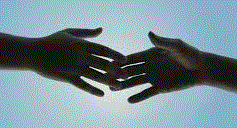 |
| Touch |
Whether it’s a gentle squeeze or a big hug, we all know that a parent’s touch can be comforting. But science shows that it can actually do wonders for your health too. “Touch can calm the stress response and lower blood pressure,” says James Nicolai, physician and medical director of the Andrew Weil, M.D. Integrative Wellness Program at Miraval Resorts. “And that has a positive effect on the entire body.”
That’s particularly true among children, says Tiffany Field, director of the Touch Research Institute at the University of Miami. In a series of studies, Field and her researchers showed that babies and kids who received regular massages from their parents reaped a number of benefits, such as better sleep, less anxiety, and a stronger immune system. “What’s more, it also helps strengthen the bond between parent and child,” she says.
Like exercise and proper nutrition, regular massage and touch is an integral part of staying healthy, says Field. Read on for more reasons why you should get touchy-feely.
1. It eases stress. “Kids love to touch; there’s a lot of hugging and wrestling,” says Nicolai. “Intuitively, they know it helps them relax and makes them happy.” Research backs this up: A study published in the Journal of the American Academy of Child and Adolescent Psychiatry found that children who received a massage had lower levels of the stress hormone cortisol, as well as less anxiety and depression than those who watched a relaxing video.
2. It fends off colds. A snuggle a day may keep those sniffles away: Touch has been shown to raise the body’s production of natural killer cells, the immune cells that help protect against viruses, explains Field. What’s more, researchers from Cedars-Sinai Medical Center showed that massages increased levels of cold-fighting white blood cells and lowered amounts of a hormone linked to the stress hormone cortisol.
3. It can improve breathing. According to a study published in the Journal of Pediatrics, asthmatic children who were massaged daily for 20 minutes before bed had better control over the condition and breathed easier after a month than those who received relaxation therapy. Stress can tighten airways, which constricts breathing, say experts. That’s why regular touch may help ease wheezing and coughing.
4. It improves sleep. “Massage has been shown to help kids fall asleep faster and snooze more soundly,” says Field. And that has a big payoff in the classroom: Researchers from the Touch Research Institute found that kids who received this touch therapy were better behaved and scored higher on attention and cooperation tests than those who didn’t.
Massage 101
To reap these benefits, consider giving your child regular massages. “In our studies, we instructed parents to give their children massages for 15 minutes every evening before bedtime,” says Field.
To start, figure out the right level of pressure: Studies suggest that a moderate amount is best. “Research shows that a very gentle massage doesn’t have the same effect,” says Field. “Kids can get ticklish from a very light touch.” She recommends practicing on yourself or your spouse first to determine the appropriate amount of pressure.
Then massage your baby or young child with gliding strokes on his or her shoulders, back, arms and legs. As your kid grows older, you can incorporate different types of techniques and include his or her hands and
feet. Ask your child what he or she likes, and if he or she is experiencing any discomfort.
“Older kids and teens tend to not like their parents giving them massages,” says Field. Rub their shoulders while they sit in a chair, or make them an appointment with a massage therapist.
Think your child would benefit from a deep-tissue massage? Avoid doing it yourself, warns Kiera Nagle, a licensed massage therapist with the Pacific College of Oriental Medicine. “If done incorrectly, this type of firm bodywork can harm muscles and nerves,” she says. Seek out a licensed massage therapist with experience in pediatric massage, says Nagle, and remain in the room during the treatment. Bonus: Most therapists are happy to give you massage tips that you can use at home.
How often do you hug your kids? Do they accept your hugs or squirm away?
No comments:
Post a Comment